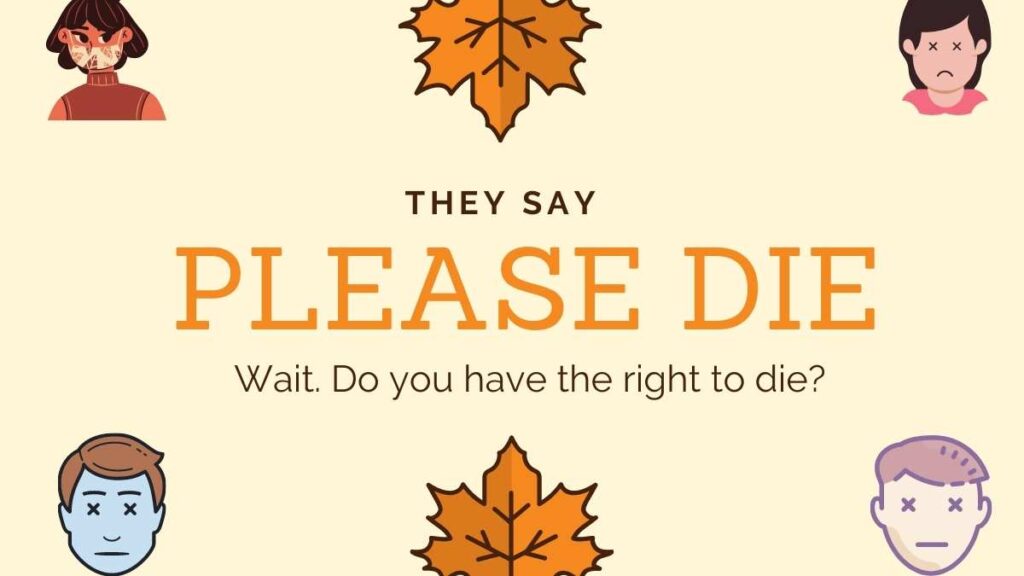The right to die is a concept that closely contradicts the concept of the Right to life under article 21 of the Indian Constitution based on the opinion that human beings are entitled to end their life or undergo euthanasia voluntarily the same way as they have the right to life.
In common parlance, this right is often understood that a person with a terminal illness, or without the will to continue living, should have the option to end their own life, use assisted suicide, or to decline life-prolonging treatments such as ventilators and the sort.
In this article, we will move away from this perspective and will only think of arguments that exclude people with a terminal illness or that are in a vegetative state.
Just so that you know, the current position in India is that a person who is terminally ill or is in a vegetative state can approach the court and seek permission to end his life.
The Supreme court also enables a person of sound mind and health to make a ‘living will’ specifying that in the event of him/her slipping into a terminal medical condition in the future, his/her life should not be prolonged through the life support system. The person concerned can also authorize, through the will, any relative or friend to decide in consultation with medical experts when to pull the plug.
Whoever attempts to commit suicide and does any act towards the commission of such offence, shall be punished with simple imprisonment for a term which may extend to one year 1[or with fine, or with both].
Section 309 of the Indian Penal Code
Therefore, If you try to kill yourself unnaturally, you are liable to be prosecuted under the Indian Penal Code. This brings us closer to a question: Do we not have the right to die?
When we reserve the right to choose the country we want to reside, the government that we want to elect, the person we want to marry, why not the right to choose between life and death?
Does article 21 of the constitution that embraces the right to life also includes the right to die?
“It is not and cannot be seriously disputed that the fundamental right have their positive as well as negative aspects. For example, the freedom of speech and expression includes freedom of speech and expression includes freedom not to speak and to remain silent. The freedom of association and movement likewise includes the freedom not to join any association or to move anywhere. Freedom of business and occupation includes freedom not to do business and to close down the existing business. If any authority is needed for his proposition, we have it in the decision of the Supreme Court , Excel Wear v. Union of India. If this is so, logically it must follow that right to live as recognised by Art. 21 will include also a right not to live or not to be forced to live. To put it positively it would include a right to die, or to terminate one’s life.”
This question first came up at the High court in State of Maharashtra v. Maruti Sripati Dubal‘s case.
The petitioner’s arguments, in this case, were that such measures of assuming that an attempt to commit suicide is an offence, the punishment is barbaric, cruel, irrational, and self-defeating.

The defendant had a different view saying that “it is the prerogative of the State to prescribe the sentence, and the nature and the quantum of sentence prescribed for the offence cannot be said to be barbaric, cruel, irrational or self-defeating. The sentence prescribed is to deter prospective offenders.”
The court held that Section 309 of the Indian Penal code ultra vires the Constitution of India as it violates Article 14 and 21 thereof and must be struck down.
This issue was again raised before the court in Gian Kaur v. State of Punjab. In this case, a five-judge Constitutional Bench of the Supreme Court overruled the previous judgment of P. Ratinam’s case and held that Right to Life under Article 21 of the Constitution does not include Right to die or Right to be killed and there is no ground to hold that the section 309, IPC is constitutionally invalid.
The court held that the positive and negative aspect of every fundamental right analogy by the previous court is “misplaced”, which could have arisen on account of superficial comparison between the freedoms, ignoring the inherent difference between one fundamental right and the other.
To the true meaning of the word, ‘life’ in Article 21 means life with human dignity. Any aspect of life which makes life dignified may be included in it but not that which extinguishes it. The ‘Right to Die’ if any, is inherently inconsistent with the Right to Life.
This is our standing as far as the courts are concerned. But a question that remains unanswered is… If the constitution of India provides us with the right to live, then why not the right to not live?
I might want to take an indirect approach here. The courts have never answered this question in straight words, but let’s look at it this way.
In the Habeus Corpus case AKA A.D.M Jabalbur v. Shiv Kant Shukla, Justice Hans Raj Khanna in a lone dissenting vote opined that the fundamental rights under article 21 i.e the right to life and liberty cannot be suspended even during an emergency. The reason he stated was that these rights are inalienable and something we are born with and that the rights such as these predate the constitution itself. It is not something that the constitution has provided us exclusively. Rights such as these are independent of the Constitution.
In his words, “Article 21 of the Constitution could not possibly be the sole repository of the fundamental rights to life and liberty as these predate the constitution itself and the existence of these rights cannot be subjugated to any executive decree even during the period of national emergency for these are inalienable to one’s life and dignified existence.”
Therefore, I think that the argument that the constitution has provided us a right to live and therefore it must provide the right to die loses its validity partially. The constitution merely reiterates what we already have so as to bring upon a binding rule in the country.
That brings us to another question If we have an inherent right to live then why not the inherent right to die?
Much of this is complete philosophy. People will always juggle between Darwin’s theory of evolution(scientific approach to how humans came into being) and Jesus’s theory of evolution i.e Adam and Eve( religious interpretation of how humans came into being).
It has always been difficult to weigh religion and science on the same scale. And I think it is the same in this question too.
We may have scientific approaches that state we have an inherent right to not live and on the same footing, we have religion implying that right to not live has never been accepted by the world’s major religions such as Christianity, Hinduism, and Muslims and in fact was always condemned.
Statutory law as we already know is always brought into legislation not just by the customs but after careful consideration of its cause and effects. It is always a pick between the problem that it tries to solve and the problem that it actually solves.
I think why not only India but most of the countries of the world do not have legislation that legalizes suicide or right to die is because it fails to solve the problems and in turn does more harm than good.
However, partial legalization that is the right to die when one is actually suffering from a prolonged illness or in a state where recovery is not possible has been allowed and is applaudable.
Let me know what you think about the same in the comments?

Passionate about using the law to make a difference in people’s lives. An Advocate by profession.




